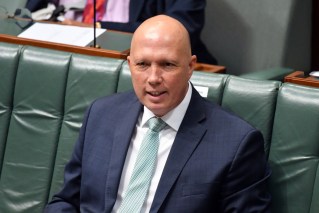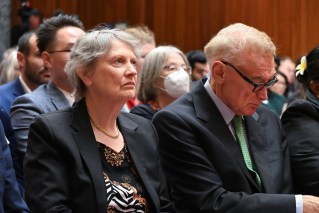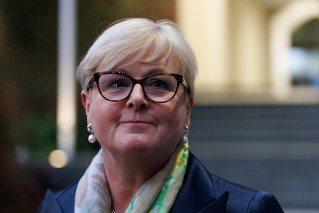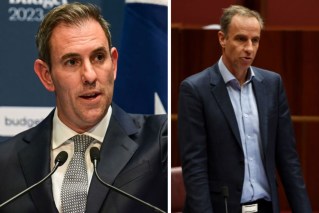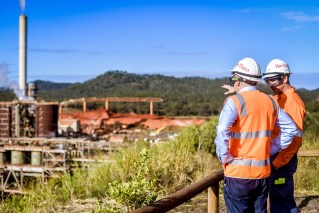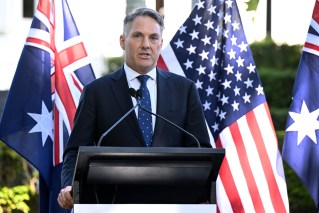Who is David Pocock, who passed key workplace changes? Not what anyone expects


'These are the biggest industrial relations reforms in at least a decade,' Senator Pocock has said. Photo: AAP
David Pocock, the Senate’s kingmaker, has confirmed he will support the government bill seeking a rare rebalancing of bargaining power in the workplace and higher wages.
So who is he?
Often the opposite of whatever people seem to expect.
Speculation abounds about policy views of the independents elected to this Parliament in former Liberal seats and mostly on the promise of action on corruption and climate.
The former rugby player who has become a presumptive casting vote in the Senate was always going to be followed closely.
Curiosity seems to be compounded by an unusually reticent personal style – one colleague described his presence as “monkish” – that leads many to describe the MP as hard to read or, per his critics, vacant or suggestible.
But when he spoke on Sunday his comments cut through.
Some were not expecting a committed Christian who played professionally a game favoured in private schools would support workplace changes opposed by a big business campaign.
And by using his leverage to secure a review of living standards for Australians on welfare payments – a constituency not particularly concentrated in his electorate – the ACT Senator seemed to challenge expectations about political negotiation.
But as the industrial relations debate heated up, the balance-of-power Senator became something of a political Rorschach blot in which people seemed to see different things.
On Sunday morning one TV pundit predicted Mr Pocock was set to hold out on the government and force them to split the signature workplace reform into two pieces of legislation.
A co-host had slightly different mail: Something might move on the bill in the next hour or two.
Only minutes later it was confirmed that Mr Pocock was supporting Secure Jobs, Better Pay.
Mistaken impressions
The New Daily has spoken to friends, pre-politics colleagues, and business groups and NGOs Senator Pocock met during the campaign who say the now-Senator rarely expressed political views despite being known for stances on environmental issues while playing rugby.
But a controversial right-wing group with links to Coalition figures, Advance Australia, sent out advertisements condemning him as an extreme leftist.
Despite that claim he had an early stoush with the government over a construction watchdog many in Labor said was built to harass unions.
Mr Pocock is a committed Christian, as is his wife, Emma, whom insiders say is his most influential adviser.
They didn’t wed until gay marriage was legal (Mr Pocock was vocal about ridding the game of rugby of homophobia.)
Senator Pocock, a committed environmentalist, locked himself onto a the site of a new mine to protest at a new coal mine in 2014.
One local there recalls Mr Pocock autographing a football but displaying no interest in protesters’ radical politics.
“I think it’s best in politics to judge people by what they do,” said a new colleague, Greens Senator David Shoebridge.
“In all my dealings so far with David he has struck me as very decent and grounded.”
Balancing interests
Senator Pocock’s career has been about balancing political interests from its beginning.
Winning a traditionally Liberal Senate seat in the otherwise deeply progressive ACT would need a new base of voter support, his campaign figured early on.
Last week, a debate about the government’s plan to increase wages and workers’ bargaining power soon became about small business’ costs.
The small business sector has been central to Mr Pocock’s politics: after the former Wallabies skipper launched his campaign for the ACT Senate earlier this year, he was often pictured wearing a work wear shirt.
His campaign’s messaging focused on small business owners, including self-employed tradies, living in the city’s fastest-growing suburbs.
Mr Pocock ran to beat far-right Liberal Zed Seselja, a coal proponent and climate skeptic who had taken over a Canberra party previously represented by ultra-moderates.
But it was not clear what proportion of those who had voted for Mr Seselja (who once warned closing coal mines would send Australia “back to the caves”) might back his campaign for greater climate action.
Small business owners, identified as the least ideological Liberal voters in the city, were the basis of a campaign for the political centre grounded in policy on issues such as housing affordability.
Traditional lobby groups for builders and small businesses opposed the IR bill but also the concept of allowing workers to band together across industries in pay deals.
Mr Pocock’s other changes exempt businesses with fewer than 20 staff from the laws (up from 15) and make it easier for those with up to 50 to quit the process.
Zen
Last week, as Parliament entered its final fortnight, pressure built while Mr Pocock reviewed a bill the government was determined to pass.
The ACTU’s head, Sally McManus, urged union members to speak out in response to a business advertising blitz against the laws.
“He is literally weighing up who to disappoint – workers or business owners,” she wrote.
The final day of negotiations on Saturday took more than 12 hours to conclude.
Senator Pocock began by meeting Anthony Albanese at the Lodge about 9 am.
His last meeting with Workplace Minister Tony Burke ended at 9 pm and with a gym session (he aims for three a day to help with strains from his football career).
Before writing to the PM to inform him of his decision he had one quick engagement. At a 10-year class reunion for a group of nursing students he said he was working on their pay rise.
“These are the biggest industrial relations reforms in at least a decade,” Senator Pocock said.
“I’ve made very clear that this is not something that I wanted to horse-trade on.”
One unexpected request
A major outcome of negotiation on the bill is an annual expert review of welfare supports like JobSeeker, which Senator Pocock says will be a “game changer” for people who live under the poverty line.
Six-in-ten Australians on JobKeeper at $46 a day report difficult getting medical care or medicine, according to a report by the Australian Council of Social Services.
“There’ll be a level of transparency there and then government will have to make the case of why they are or aren’t taking those recommendations on board,” he said.

